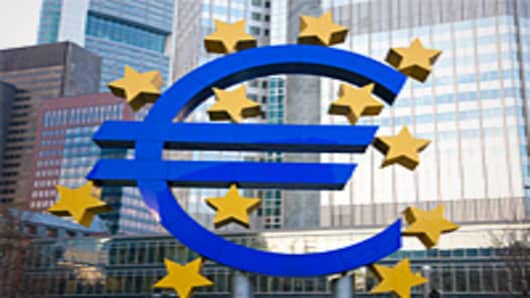Friday's meeting between euro zone finance ministers in Poland, which U.S. Treasury Secretary Tim Geithner will attend as a guest, is clearly an event risk for market bears. But already the big idea for solving Europe's debt problem is dead in the water.
At the Frankfurt auto show on Thursday, German Chancellor Angela Merkel again reiterated her absolute opposition to euro bonds; Germany is not ready to guarantee joint bonds issued by its 16 neighbors. Merkel will likely broker an agreement to delay Greece from defaulting for a couple of months.
But the euro zone's 17 member nations are already so fractious over ratifying the July 21 deal that its leaders have little room to deliver any sort of blockbuster solution.
Technical work is underway in Brussels on how to make the European Financial Stability Facility (EFSF) bailout fund go further by potentially guaranteeing other people's losses on sovereign debt rather than buying directly, or on allowing the European Central Bank to indirectly swell the fire power of the EFSF via swap/repo arrangements.
There's even a discussion about making the EFSF into a bank with direct access to ECB funding. But none of these ideas will be on the table at Friday's meeting.
Sources say the fact that the U.S. is sending Geithner to the meeting will add a seriousness that should keep a lid on the usual bickering between junior partners — and could create a more "can do" atmosphere.
Geithner will certainly call for an urgent re-capitalization of Europe's banks.
But watch the central banks. The ECB and the Federal Reserve still have the fire power and autonomy to act boldly, as seen Thursday.
Some euro bulls hope the ECB will start writing credit default swap contracts guaranteeing sovereign debt rather than buying it, in order to crush market rates.
But that wouldn't solve the debt problem and might backfire at primary auctions.
Alternatively, were the ECB to get involved in recapitalizing Europe's commercial banks — to create a framework for fresh cash — that really would constitute a big "shock and awe"-type move.


